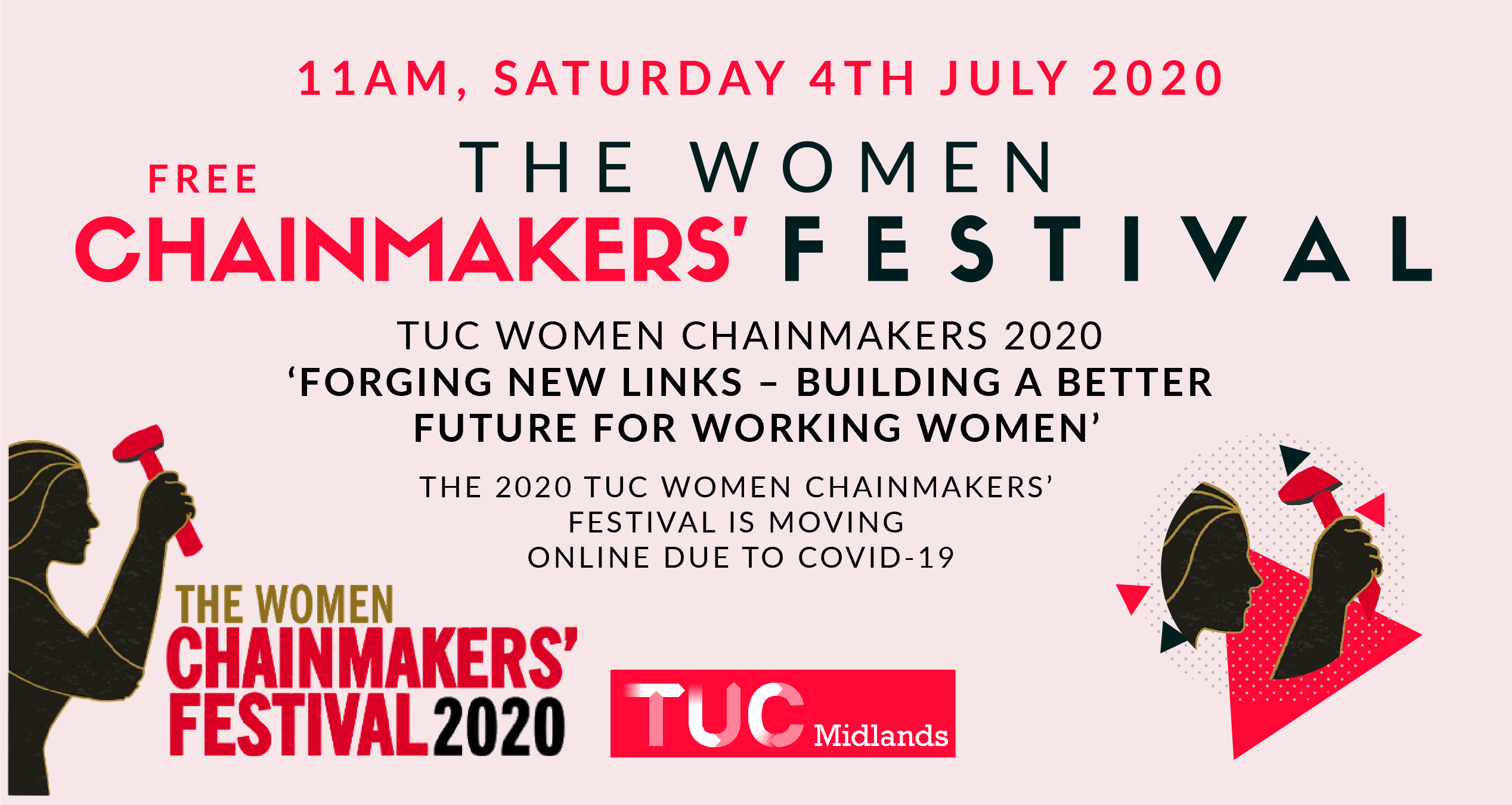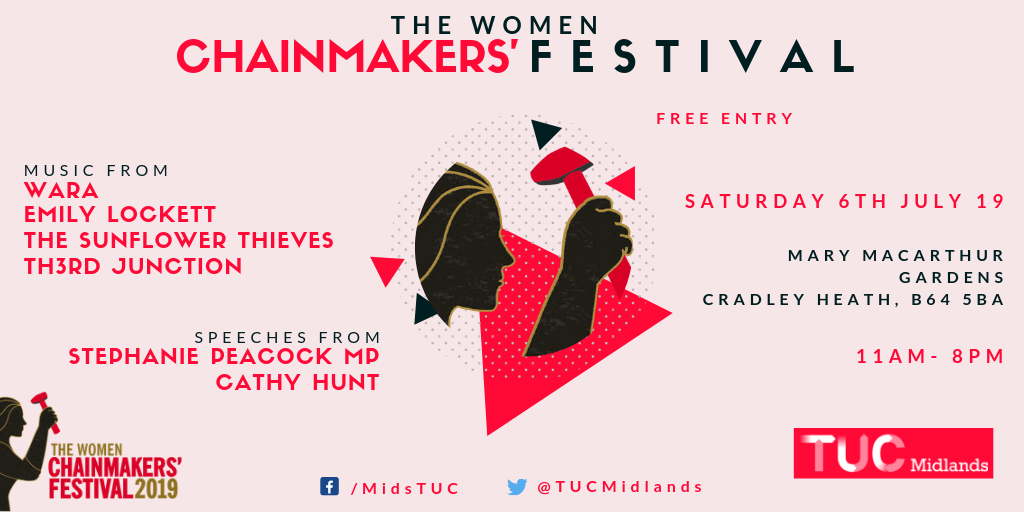
Sat 29th June 2024
11am to 5-30pm @ Mary McArthur Gardens, Cradley High Street B64 5BA

Wolverhampton TUC will have a stall, come and visit us.
see also official website @ https://www.womenchainmakers.org.uk/
The Midlands TUC run this event annually on the first Saturday of July in Cradley Heath.

Addressing the 2023 festival were:
- Rachel Harrison, GMB Public Services National Secretary
- Louise Atkinson, NEU President
- Jane Jones, USDAW President
- Sarah Coombes, West Bromwich East Labour PPC
There will also be a panel discussion on Leicester’s garment industry, with speakers from GMB and Unite who are organising the sector, the community organisers in Leicester funded jointly by unions and fashion brands as well as campaign groups such as Labour Behind the Label and War on Want.
We’re also going to have a ‘Campaigning Women’ panel consisting of trade unionists from the region discussing the campaigns they’ve been driving over the last year.
Come and visit Wolverhampton TUC’s stall at the festival
This will be another family-friendly event in Cradley Heath, the home of the historic 1910 dispute. We’ll again have a full day of union stalls, speeches and the fabulous theatrical re-enactment of the dispute and victory speech by the inspirational Mary Macarthur.
This year we are set to hear from leading national women trade unionists about the industrial action and campaigning that has been so prominent this year.
We’re also going to have a panel of women trade unionists from the region discussing and debating the activity of unions across the Midlands.
Finally, we will have a dedicated panel focussing on the garment trade both in Leicester and across the globe and how unions are engaging in innovative methods to engage, recruit and organise vulnerable women workers.
——————————————-

The 2022 TUC Women Chainmakers’ Festival was back in person this year at Mary Macarthur Gardens in Cradley Heath after a two year break due to Covid-19.As ever, the event will be a family friendly day with music, street theatre, debates, stalls and kids activities. We will both remember and celebrate Mary Macarthur and the women chainmakers of Cradley Heath as well as discuss how to tackle the issues facing women in the world of work and wider society.We are delighted that Michelle Stanistreet, general secretary of the NUJ, will share her views and experiences of women and the media in a 1 hour discussion panel.
We will also have a ‘Campaigning Women’ panel, where we’ll hear from leading female activists from across the midlands about some of the campaigns they’ve been leading on over the last 12 months.
We look forward to seeing you there!
The 2021 TUC Women Chainmakers’ Festival was Sat 3rd July – the event involved two panel sessions focussing on leading women in the movement and from women who’ve been on the front line fighting for workers this year.
10.30 – 11.30: Women leading the way
- Rehana Azam, GMB National Secretary
- Tracy Brabin, West Yorkshire Metro Mayor
- Frances O’Grady TUC General Secretary
- Louise Regan, NEU National Officer and TUC Midlands Chair
- ‘Call to Arms’ re-enactment (Sheila Chamberlain)
12.00 – 13.00: Women striking for success
- Sarah Evans, PCS, DVLA
- Venda Premkumar, Redbridge NEU
- Vanessa Roberts, GMB, British Gas
Chaired by Kathryn Salt, TUC Midlands Women’s Committee
Mary Macathur centenary exhibition
https://www.tuc.org.uk/sites/default/files/2020-12/LifeofMaryMacarthurTUCLibraryExhibition.pdf
2020 Women Chainmakers’ festival virtual event
+ New digital exhibition explores the historical significance of trade union leader Mary Macarthur and the work of the National Federation of Women Workers.
Using the TUC Library’s archives it illustrates the harshness of women’s work in the early 20th century and the campaign to organise women workers into trade unions. Visit the exhibition here….
2020 TUC Women Chainmakers – ‘Forging New Links – building a better future for working women’
2) Short chain making related films.
3) ‘Forging new links’ interactive panel discussion.Panel included:
– Dana Mill, writer and activist.
– Eleanor Smith, ex- MP for Wolverhampton South West and long
standing local activist.
– Zarah Sultana MP, Coventry South
– Nicky Downes, Joint Branch Secretary Coventry NEUChair: Katherine Salt, TUC Midlands Women’s Committee, ChairThe panel will explore how progressives can build wider coalitions to broaden support and secure real and lasting change.
The National Education Union (NEU) is hosting this event on behalf of TUC Midlands Region.

NEXT outdoor EVENT WILL BE JULY 2021

annual Midlands TUC Chainmakers Festival, Saturday 6th July 2019, the largest celebration in Britain of women’s political history.
11.00 – 20.00 | Mary Macarthur Gardens
This year the festival was revamped with all activities taking place in Mary Macarthur Gardens.
Stalls, the new ‘Leftfield Tent’ withactivities for kids, as well as political debate, with panels exploring the role of women in trade unions and society and how to organise young workers.
The much loved theatrical re-enactment with a banner parade around Cradley Heath,plus main tent with speeches and music.
Headlining the festival was the Latin funk band Wara
Leftfield Tent
12.00 Children’s activities workshop (and ‘Call to Arms’)
13.00 Young Workers Panel debate
14.00 ‘Women in Leadership’ panel
14:30 Victory Speech
14:45 Banner Parade
Main Tent
15.10 Third Junction
16.15 Steph Peacock MP
16.30 Sunflower Thieves
17.35 Cathy Hunt & Louise Townsend
17.45 Emily Lockett
18.15 Wara
 A family friendly street festival involving market stalls, fun fair rides, speeches, street theatre, music and debate.
A family friendly street festival involving market stalls, fun fair rides, speeches, street theatre, music and debate.


How to get to Cradley Heath from Wolverhampton by train:
off-peak Day Return
leave Wolverhampton Rail Station, taking London Midland train towards Walsall
change at Smethwick Galton Bridge Rail Station
take London Midland train towards Kidderminster
arrive at Cradley Heath Rail Station see the journey planner here….

Leave a Reply
You must be logged in to post a comment.